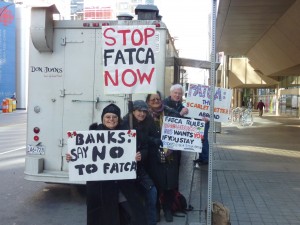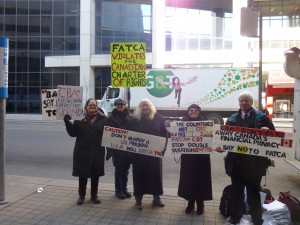photo from yesterday, day 1 of protest
PROTEST EVENING POSTMORTEM:
I know that this small protest did reach the FIsters attending the conference and put them on notice–because most refused to look us in the eye.
This protest happened because of the dedication of on-site protesters including Atticus, Marie, Northernstar, Peter, Tricia, and WhiteKat, those (including Blaze and James Jatras) who helped in preparation of the letter to the Canadian Bankers Association that was critical to the protest, and because of the others I am not certain that I can mention.
Amazing people, all.
On-site coverage from IRSCompliantForever :
15.54. A last goodbye from all of us to the banksters.
15:03. Banker from small bank who hates FATCA just signed petition.
14:24. AttIcus just explained FATCA to passerby. Response was “Well, the banks need a little (words deleted).”
14:14. Banksters we meet all express sympathy but insist that there is no way to prevent FATCA. So many passerbys wondering about this FATCA word.
13:18. Fellow from one of the major banks visited with us had a friendly chat and accepted the CBA letter. He asked that we not disclose the name of his bank. Banksters are also taking pictures of us.
12.55. Another passerby came up to us expressing concern that her daughter has a Green Card.
Reports and photos of earlier today and yesterday after the jump
12:53. A passerby just came up to us expressing concern that she was born to a US parent and asked whether FATCA applied. Atticus explained and the woman thanked us for being here.
11:23. Unexpectedly another protester arrived with signs. Someone we all know.
11:13. Police have arrived again.
10:51. Nice sunny day. One bankster inside gave us the thumbs up. We had a nice chat with two reps of a major FI who accepted the CBA letter.
***
Day 1 of Protest – Yesterday, 13 November
13:40. Stuck on a narrow curb.
13:07. New development. Head of security informed us that we had to move to the curb in which we must remain 18 inches from the street. I called the police to resolve. Three police officers came and tried to intervene with security, but security refused as walkway is technically on private property. Want to emphasize that police tried their very best to help us. We will try not to tip over on curb. Lots of interest from passerbys. Morale very high.
12:50
12:46
12:13. Above is a photo of four Brocker/Sandboxers taken by a sympathetic passerby. Note that the person holding the “Do not marry an American” sign is a guest Brocker who is a kindly non-US spouse of a US person. She strongly supports the message of the sign and wants to be known as @LauraSecord. Small group but morale is high.
11:09. Met a fellow working for a bank. He says FATCA is painful.
11:02. Tricia, Marie, NorthernStar and IRSCompliantForever just spoke to a very friendly and receptive journalist who will include mention of our protest in an article He also said that this is the first FATCA protest he is aware of. We cannot mention name of journalist. We are pointing signs at the conference room. Doors are closed now so that banksters cannot see us.
09:37. Peter is standing immediately in front of the conference meeting room. We can see them and they can see us. But we cannot enter.
07:33. Peter and I are on site. We were told us that we would be arrested if we entered building. Tried to leave CBA letters but conference organizer refused and noted that our comments on IBS about CBA were inflammatory.
***
The conference is “Canadian Institute’s 19th Annual REGULATORY COMPLIANCE for Financial Institutions” at the North Building of the Metro Convention Centre in Toronto which has been brought to our attention through the diligence of @Tricia. http://www.regulatorycomplianceforfis.com/













Pingback: Thoughts on @TorontoCentre Nov. 18 #FATCA #TorCen All Candidates Debate | Toronto Centre Debates - All candidates debate
Pingback: The Isaac Brock Society
@J. E. Gutierrez,
I want to thank you for your comments on this and other IBS threads. I learned a great deal from your carefully crafted statements, what you chose to pose to us as questions to try and reframe the FATCA problem – from the bank perspective, which points you chose to address, and which to ignore.
@badger
Thank you for your comment, which I will assume is truly meant.
In an earlier post, I had compared the “interests” of Canadian banks’ stakeholders with the “rights” of US persons impacted by FATCA. In hindsight I can understand why this choice of words may be found objectionable. For the avoidance of doubt, I entirely and wholeheartedly agree with you that many aspects of the law are offensive. At the same time, I take the view that one should accept that unless something radical happens in the US Congress, FATCA will not go away and we will have to learn to live with it.
In this context, I am often surprised that many on this blog appear to think that Canada’s rejection of an IGA will somehow stop the application of FATCA with respect to Canadian banks. I have seen that representatives of IBS have sent a new letter to the CBA to demand that they reject FATCA, and was slightly puzzled about it.
Regardless of whether the Canadian government enters an IGA or not, FATCA will continue to apply to any bank with direct exposure to the US markets, or indirect exposure by way of the pass-through rules I discussed on this thread a long time ago. This applies to all Canadian FFIs, even the credit unions unless they are so local that they do not even need correspondent banking relationships (in which case they would be extraordinarily risky, but that is another story altogether).
I do not view non-compliance as an option and I have explained extensively why. Of course, this is only an opinion, and I accept that many will have a different one. However, I have yet to read or hear from a single banking, tax or even academic expert who believes that non-participation in FATCA is a possible way forward. The absence of an IGA will make compliance a messier, costlier and risker procedure. These are incremental costs that ALL Canadian savers, accountholders, shareholders, creditors, borrowers and eventually taxpayers will have to bear, and not just those that bank with institutions represented by the CBA or IIAC.
@J.E. Gutierrez, the banks basically have the option to break American law, with punitive monetary consequences, or Canadian anti-discrimination laws exposing themselves to lawsuits in Canada. Given the stakes, as you mentioned earlier, it is not up to them to decide. This is up to the government of Canada. The banks will be told what to do when a decision is made. In the meantime, I don’t really understand why, with such a controversial decision, banks would spend millions of dollars to comply to something that the government of Canada might ultimately say: “you can’t do it”. They should wait for the green light from the government. And if they wanted to get up to speed, update their IT systems to allow for the required fields to be entered, and the data to be easily mined.
Ultimately, I don’t see how the government of Canada would agree with something more than automating reporting the info of non-residents, since the rest would be a violation of the charter of rights. That should be their line in the sand, as it should have been to all countries who signed an IGA. Unfortunately, it wasn’t.
It will certainly lead to some lawsuits in the future, depending on how the IRS will decide to go after accidental Americans or joint accounts of American/non-American couples. It’s going to be messy.
@J.E.Gutierrez,
There are counter measures that our government can take if the USA insists on FATCAing us. Canadian banks can work with our government to suggest, and implement such countermeasures. Jim Jatras came up with a few examples. To decide that there is no way out of FATCA is a cop out, period.
Do you work for the Canadian banks, the IRS, or some other organization that is pushing for FATCA compliance?
@J.E. Guiterrez,
Canada is a critical ‘win’ for USA on FATCA. If Canada doesn’t sign, FATCA is toast. I can understand why certain people, perhaps you are one of them, are working hard to ensure Canada signs on.
@Chris
I entirely agree with you that it is up to the Canadian government and legislators to decide the way forward. This is the point I have been trying to make on this thread.
However, since the lead times will be extremely tight to meet the deadline for compliance, it may be prudent for the banks to start preparing the necessary groundwork.
@J,E Guitierrez,
If banks had spent a fraction of the money they have already spent on being ‘prudent’, on lobbying against FATCA instead, there would be no FATCA. That is the point that many of us have made, not just on this thread, but on many threads.
@JEG,
I do truly find your choice of words, phrasing and arguments very interesting although I don’t subscribe to them. I do sincerely find them educational, though not personally persuasive.
And,
re;
…”The absence of an IGA will make compliance a messier, costlier and risker procedure. These are incremental costs that ALL Canadian savers, accountholders, shareholders, creditors, borrowers and eventually taxpayers will have to bear, and not just those that bank with institutions represented by the CBA or IIAC.”
“ALL Canadian savers, accountholders, shareholders, creditors, borrowers and eventually taxpayers” would have to bear resultant costs with AND without an IGA. But some will definitely have to bear more than others under a signed IGA. Are you saying that to mollify the US, and to reduce the ‘risks’ to some, that is is acceptable to sacrifice some?
Re ‘costs’, we have not seen any robust cost/benefit analysis or details for the FATCA scenario as applied to Canada – with or without an agreement. If such cost/benefit figures exist, then they should be made publicly available for examination and critique. I note that this document http://www.publications.parliament.uk/pa/cm201314/cmselect/cmstatin/304-iii/304.pdf for the UK refers to agreements that pose ‘a charge on public revenue’ . As the UK is a parliamentary democracy whose IGA was sometimes referred to as a window into a possible ‘model’ for what Canada might be subjected to http://www.cucentral.ca/Connections/Connections%20FATCA%20July%202013%20FINAL.pdf , I wonder what ‘charge on public revenue’ we are being committed to in Canada (ex. cost of CRA implementation, loss of Canadian assets to US extraterritorial taxation, etc.)? Surely if the costs of not committing to a FATCA IGA are as you and others have said, then the costs of complying should be considered and requires fiscal planning and budgeting by the Harper government? What is the bill Canadians will pay for FATCA?
‘Ongoing’ does not begin to describe the nature of the open-ended commitment and costs to be levied on Canada and Canadian taxpayers – who will be bound by a unilateral US domestic law with the usual built in ‘saving clause’ and ‘last in time’ rule that asserts the right and intention of the US to reserve its usual option to change the terms at any time without notice or agreement or recourse by the other signatory (see for ex. http://www.vanderbilt.edu/visit/international-tax/tax_treaty_savings_clause.php http://www.ctf.ca/ctfweb/Documents/PDF/1996ctj/1996CTJ5_Oliva.pdf ) . This is the case already with the US-Canada tax treaty, and we have seen how they behaved re the Obamacare investment tax – which our present treaty does not cover or protect us from http://www.canadianbusiness.com/blogs-and-comment/the-obamacare-tax-that-might-hit-canadian-pensions/ . The US didn’t bother to notify Canada of that issue, or to address it. We in Canada were only exempted from the main Obamacare enrollment and payment provisions at the last minute via lobby groups like the ACA. Past behaviour is the best predictor of future behaviour. We can expect more of the same.
What is the present and future cost to Canada? I don’t think it is enough to broadly say that the cost without an IGA would be greater. Any agreement with the US, and particularly FATCA, is a moving target. The US contemplates this as a forever agreement. Are we to sign on to a one-sided and open-ended agreement to bind Canada and all of its citizens and taxpayers forever, but not the US – in the name of unquantified damage control you describe as a “messier, costlier and risker procedure” without an IGA?
And as to ‘benefit’ there is no reason for Canada to put any faith in the empty promises by the US Treasury to: “prescribe regulations that would require reporting of information with respect to nonresident alien individuals, entities that are not U.S. persons, and certain U.S. entities held in substantial part by non-U.S. owners, including information regarding account balances and payments made with respect to accounts held by such persons and entities.”
(from Fiscal Year 2014 Budget request sent up to Capitol Hill in April (Analytical Perspectives to the Fiscal Year 2014 Budget, page 202):
“Provide for reciprocal reporting of information in connection with the implementation of the Foreign Account Tax Compliance Act (FATCA). — In many cases, foreign law would prevent foreign financial institutions from complying with the FATCA provisions of the Hiring Incentives to Restore Employment Act of 2010 by reporting to the IRS information about U.S. accounts. Such legal impediments can be addressed through intergovernmental agreements under which the foreign government agrees to provide the information required by FATCA to the IRS. Requiring U.S. financial institutions to report similar information to the IRS with respect to nonresident accounts would facilitate such intergovernmental cooperation by enabling the IRS to reciprocate in appropriate circumstances by exchanging similar information with cooperative foreign governments to support their efforts to address tax evasion by their residents. The proposal would provide the Secretary of the Treasury with authority to prescribe regulations that would require reporting of information with respect to nonresident alien individuals, entities that are not U.S. persons, and certain U.S. entities held in substantial part by non-U.S. owners, including information regarding account balances and payments made with respect to accounts held by such persons and entities.”
I am aware of the issue you raise that it may well eventually be that all credit unions – even though small and local institutions, will be burdened by FATCA as well as banks. I think though that banks will find that a backlash from accountholders – and their family members is inevitable – and credit unions are an attractive alternative. Complying with a FATCA IGA will make our current FI relationships “messier, costlier and riskier” as the owners of the assets in question. And I don’t think that for the CBA to contemplate deliberately increasing hurdles in moving assets and closing and opening accounts http://www.americanbanker.com/bankthink/once-sticky-customers-are-coming-unstuck-1057363-1.html will work if they are contemplating it – in conjunction with FATCA it will only poke the raw wound with a sharp stick. Consider how a long-time Canadian accountholder is going to feel when forced to prove their citizenship, and non-US status to a bank – as well as anyone related to them – ex. a spouse? I don’t think that there is any way for the FIs to put a spin band-aid over that. Our resentment and anger you see here is a foreshadowing of what Canadian banks and FIs can expect. Even if they can point to the Canadian government as having signed US compliance into law in Canada – it will not divert the anger. Banks are a far more present and accessible daily presence than Prime Minister Harper (who will see his own significant backlash to the Conservative party). The vein of anti-US feeling is always running below the surface of life in Canada. And no-one loves the US IRS or taxes – and this involves our hard earned, taxed and saved assets. The relationship between accountholders and banks already often has significant adversarial aspects (ex. see http://www.thestar.com/business/personal_finance/2013/10/27/four_bank_service_charges_we_love_to_hate.html), which are going to be exacerbated by FATCA. Even if credit unions are to be bound as well, our relationship with them is already better where we are members, not just ‘accountholders’.
I would really appreciate it if you would directly address and acknowledge the significant and unique costs to Canadian citizens and legal resident individuals deemed to have ‘US taxable status’, and particularly the plight of minors and dependents who are prevented from renouncing – and thus will have their RESPs and RDSPs not only double taxes, but penalized by the US – which FATCA will help to expose to significant and unwarranted risk. Even if you, and the CBA take the position that what you see as a necessary signing of a FATCA IGA will result in the conscious sacrifice of those individuals and legal local Canadian assets bound and vulnerable to FATCA’s provisions.
A related issue that the CBA and FIs do not touch is that of the joint account holders who have NO US obligation – this includes NON-US business account holders, spouses, and family members.
There is a moral and ethical dimension to this which exists whether FIs or observers acknowledge it or not. Obdurate avoidance of that dimension of this issue will not make it disappear. The minority are at additional and substantial risk, and are to be sacrificed under a FATCA IGA. That will be a conscious choice by the Harper government if/when it signs to a FATCA IGA, and it is a consciour choice by the FIs who lobby behind the scenes. There is no doubt now that they understand the repercussions and the consequences for > 1 million ordinary Canadians – including those born here in Canada who merely had a US parent and those who are merely married to or in a business partnership with someone with a US birthplace.Even organizations who see their raison d’etre as a pure pursuit of maximum profit do not exist in another universe entirely devoid of moral and ethical considerations. I don’t think that it can be reasonably argued that signing a FATCA IGA is a moral and ethical imperative.
@J.E. Guiterrez,
You make it sound like the banks are so innocent, and have done nothing to encourage our government to sign an IGA. CBA has not been meekly waiting around for the Canadian government to tell them what to do. It has been actively advocating for an IGA so that Canadian banks can legally throw innocent Canadians under the bus. The banks have not been ‘prudent’ getting their systems FATCA ready, ‘just in case’. They have been pushing for and preparing for FATCA. They are traitors.
ooops, only one ‘waiting’ was necessary.
@ Badger, how did you type so much so quickly? I prefer short responses myself, so as not to make so many typos.
@badger,
Have you ever heard the phrase, ‘Bull Sh*t baffles brains’?
@badger,
Just to clarify, I was not referring to you as the person writing Bull Sh*t.
badger NEVER writes Bullsh*t. Badger is always right on track; asks the right questions — not that they are answered.
@WhiteKat, it took quite a while, though pressing ‘enter’ makes it look like magic.
But I see typos I tried to scan for, and which I can’t correct after the fact unfortunately.
In trying to convey the issues and complexities, I find I cannot make it shorter without sacrificing nuance and always hope that including references is helpful where possible – for people to pursue further or weigh, as they wish. But that means trying the patience and attention span of readers!
@Badger
Don’t ever change a thing!
@ALL
yes, I think bankers are acting like traitors to their own Canadian citizens.
Thought of us accepting the refrain from the bankers that they have to think of all their shareholders and customers is like they are like asking Canadians to let one child die so that others will have the nice things and more food.
Any comment on that @JEG?
I met a man in his 30s today when I dropped off something for him to fix. I told him about FATCA and he signed the petition and took a blank copy to make more . I gave the FATCA fact sheet and our IBS card. He is going to spread the word.
His mom is a snowbird and he says it does not look like she will be going south to America any more.
We should start a boycott of America like the California grape boycott to support the workers. It worked. As the boycott of South Africa to protest Apartide.
The world can live without America. Can America live without the world?
Thanks for the clarification WhiteKat, I understood what you meant! : )
Thanks calgary and bubblebustin.
In the political, social, commercial and international ‘marketplace’, whose words, ideas, and concerns about FATCA will prevail? Might tends to make right, even if in ‘democracies’ it tends to have to have a thin layer of spin or gloss applied on top in order to make the consequences more marketable. The US would not have been able to get this far with FATCA if ALL governments and FIs were laying bare what it really means to the education savings of children, and vulnerable dependents, and law abiding ordinary families – that is why there is no discussion of the consequences of the choices they are making, and laying bare that certain classes of individuals and families are marked to be sacrificed. If Canada had publicized the more egregious details of the current deficiencies of the US-Canada tax treaty – ex how it allows for our registered savings to be treated to US extraterritorial taxation and punishment as ‘foreign trusts’, (plus the PFIC issue with Canadian mutual funds, and the US capital gains on our principal residence, and taxation of disability and other non-wage income) and then illustrated what FATCA would do to Canadians – using some of the more egregious examples, and other countries followed suit, at least it might pose a more embarassing diplomatic problem for the US.
@northernstar, re; …”We should start a boycott of America like the California grape boycott to support the workers. It worked. As the boycott of South Africa to protest Apartide.”..
I think that this is an idea to consider. We could at least state formally that we will boycott making any direct US investments – including property and tourism?
@Badger: I’ve already done most of that and will continue to do more. I have transferred large sums of money out of my bank. When my branch manager called me to ask me why, I said “I don’t trust you not to FATCA or close my account.”
I also told her very clearly I would be transferring more when it was up for renewal,which happened recently. This time I didn’t get a cal from her. ‘
She knows to expect more transfers over the next year. I was a 32 year loyal customer of that bank. I will never trust them again.
As JEG pointed out, banks only care about profits, despite all their publicity about customer service, community involvement and corporate responsibility.
Long before FATCA, I always took the position I did not want any US investments. I now have ensured I have no investments in Canadian banks through mutual funds or other investments tools. It certainly reduces my investment options, but I have to do what is right for me morally, ethically and personally.
@Blaze, I agree, and applaud your actions.
I also think we could start making the growing pitfalls of ‘snowbirding’ more public, not only to warn snowbirds of the current and growing US tax dangers https://secure.globeadvisor.com/servlet/ArticleNews/story/gam/20131122/SRWEALTHMGMTSNOWBIRDSATL , but also as a way of encouraging a boycott of the US – denying them Canadian dollars in retaliation for their FATCA arrogance.
@JEG,
I appreciate your comments. I don’t know the answer to many of the issues this situation poses. What I do know however, is that it boils down to this. There is no way the entire world should just cower to a US law. This is the sort of fear the US instilled in all of us about Communism. Some totally oppressive , unstoppable force that flies in the face of all that is reasonable. If there is no “out” for the banks, then other means need to be explored by all levels of government, banks and industry. FATCA is an undeserved sanction against good-faith trading partners plus everyone else. The countries that are able should join and find ways to hit the US where it hurts- in their pocketbooks. Surely a cooperative effort among other nations could come up with a few sanctions of their own. It is simply outrageous. Period.
@Blaze
My understanding is that Canadian banks are retail (heavily into providing products to individual consumers) vs corporate based, so what you did at your bank (a mini bank run) scares the crap out of the banks here. Good on you.
Anyone living near Meech Lake able to protest on December 16th?
http://www.fin.gc.ca/notices-avis13/2013-12-12-eng.asp
http://www.fin.gc.ca/notices-avis13/2013-12-12-eng.asp